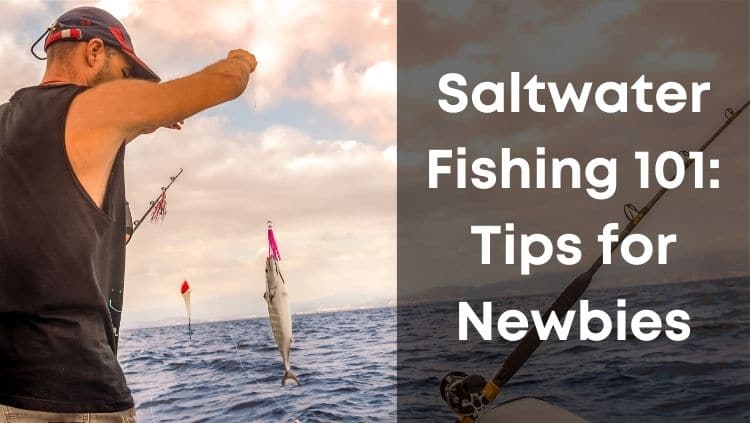Our country’s many coastal waterways provide anglers with a wealth of opportunity which can be seized upon by any ambitious individuals willing to venture out in search of success. Every year, an untold number of anglers take to such destinations in search of hot saltwater fishing action.
While saltwater fishing can be delightful, the sport can also pose quite the learning curve for those who have yet to experience such an adventure firsthand.
The following guide is intended to shorten this learning curve by providing every angler with the necessary information to find consistent saltwater fishing success.
Types of Saltwater Fishing
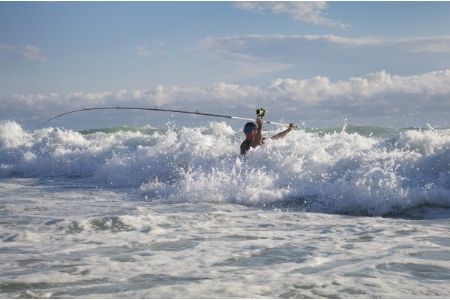
The term “saltwater fishing” is used to describe any fishing pursuit that takes part in coastal fisheries where saltwater is present. However, saltwater fishing can be categorized into several individual pursuits, all of which differ in context.
The following are several of the most popular forms of saltwater fishing.
Surf Fishing
Surf fishing is conducted from the beach or while wading the surf a short distance from the shoreline. This type of fishing is a favorite of beginning and experienced anglers alike, as you can catch many different fish species in this manner.
Those who surf fish typically employ a 10-15 foot rod and a heavy-duty spinning reel for maximum fighting potential. Shrimp, squid, and mullet are favored bait forms for surf fishing.
Bay Fishing
Bay fishing is another form of saltwater fishing, which is quite popular with anglers near the coast. This type of fishing involves working reefs and other forms of structure found within secluded coastal bays to entice the abundant fish that reside in such locations.
Most bay fishers utilize spinning reels and heavy-action rods, typically ranging from 6-8 feet in length. Jigs and spoons are among the most popular lures bay fishermen use, though cut bait can also be very effective.
Pier Fishing
As its name would suggest, pier fishing involves fishing from an elevated pier in hopes of catching fish that hold close to shore. In most areas, many different fish species can be caught when fishing from a pier, primarily when the pier in question extends far from shore. Pier fishing is also an excellent way to introduce children to the sport of fishing or to allow mobility-impaired anglers to experience an enjoyable afternoon fishing on the water.
Pier fishers typically favor spinning tackle, with pier fishing rods ranging 7-10 feet in length. Having a net or gaff at the ready is also essential, as retrieval when pier fishing can be somewhat tedious.
Flats Fishing
While you can find much associate saltwater fishing with open water and pounding surf, some of the most incredible fishing is in backwater canals and shallow water flats. Many of these coastal fisheries are home to a significant amount of opportunity for those hoping to catch redfish, tarpon, and flounder. While flat fishing can undoubtedly be conducted from the bank, the use of a boat will allow you to cover a far greater expanse of water on any given day.
When flat fishing, most anglers use gear similar to that used when bass fishing in freshwater. As are spinning and baitcasting reels, medium to heavy action rods are standard. Line weights of 12-15 pounds should be sufficient in most applications when an angler adequately meters their drag.
Deep-Sea Fishing
When most anglers think of saltwater fishing, deep-sea fishing often comes to mind. Deep-sea fishing involves utilizing a boat to reach open water, where you can fish reefs, wrecks, and other structures. These open water locations often harbor the largest saltwater species, prized for their fighting ability. A deep-sea boat trip often yields considerable numbers of snapper, grouper, amberjack, wahoo, and cobia.
Much of an angler’s gear selection when deep-sea fishing depends upon the fish species they plan to pursue. Medium to heavy action offshore rods are typically employed, using duty-specific baitcasting reels. Line selection is also dependent upon the pursuit of the day. However, 20-50 pound monofilament is relatively standard.
Pro Tip: Many anglers begin their saltwater fishing careers by surf fishing or pier fishing. These two pursuits require little in the way of expensive gear and can be enjoyed by anglers of all ages and experience levels.
What You Need to Saltwater Fish
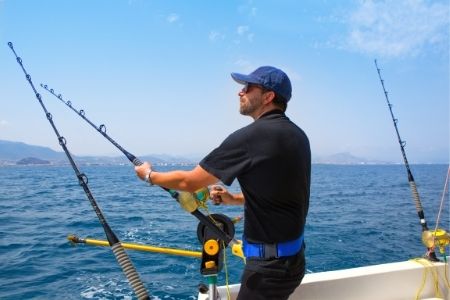
When planning for your initial saltwater fishing outing, there are several pieces of crucial gear that you should have at your disposal. Each of these items plays a vital role in presenting you with the best possible chance at a successful day on the water.
Rods & Reels
Before heading out on the water, locating the perfect rods and reels for your particular application is essential. As a general rule, the larger the fish species pursued, the more robust your rod and reel will need to be.
While some inland fishing applications require little more in this regard than the same setup you would use when fishing for bass in freshwater, deep-sea anglers typically utilize heavy-duty offshore rods and specially chosen baitcasters. Therefore, if you intend to pursue fish of varying sizes, you might require more than one setup.
Pliers/Cutters
Due to the size and aggressive nature of many fish encountered when saltwater fishing, landing a trophy is seldom as easy as reaching down to scoop up your fish or hoisting it from the water. Instead, an angler must be prepared to net or gaff their catch.
It is also essential to have a pair of application-specific pliers/cutters on hand when saltwater fishing. This will allow you to sever lines and remove hooks as necessary quickly.
Bait Prep Supplies
An angler must come armed with all necessary to prepare their bait for use. You will likely need a holding bucket with an included aerator if using live bait. If fishing cut bait, it is an excellent idea to carry a sharp knife of the appropriate size. A cast net will come in quite handy if you intend to catch your bait.
Tackle
It is always wise to have enough tackle at the ready, to weather any possible inconvenience. A well-prepared angler always keeps extra hooks, swivels, and weights by their side. This allows you to rig your gear on the fly in a bid to get back to fishing as quickly as possible, thereby enhancing your chances of success.
Appropriate Clothing
Coastal weather is anything but predictable and should be taken extremely seriously. Before venturing out on the water, ensure that you are adequately clothed for the day ahead. It is crucial to also have ample rain gear on hand. Ocean storms can blow up at a moment’s notice, leaving an angler in trouble if not adequately prepared.
Pro Tip: While no means mandatory, any angler fishing by boat would be wise to consider taking a GPS along on their trip. If you happen to become disoriented and unable to recall how you came, a simple check of the GPS can erase all doubt. Additionally, a GPS unit can mark the whereabouts of good fishing if underwater structures such as reefs are located.
Bait You Need to Saltwater Fish
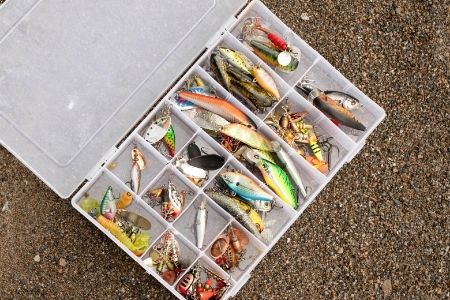
The best type of bait for saltwater fishing depends on the species of fish you are pursuing and your general location. Every fish has its favored food source, and it is an angler’s job to determine what this food source is upon heading out on the water.
One excellent way of locating the best bait for the task at hand is to speak with other anglers at local tackle shops and fishing piers. Likewise, employees at local dockside fish processors tend to be excellent sources of information.
Generally speaking, both live and cut bait work well in most saltwater applications. Shrimp, squid, mullet, and regional specific baitfish are worthy of consideration. If you intend to use artificial lures, there are a few additional considerations that you must take into account.
First, your lures must be easily visible to predatory fish, even in choppy conditions. The easiest way to ensure this is to use brightly colored lures or those that reflect light, such as spoons. Additionally, fish can better locate lures if they produce vibrations or splash across the water’s surface. This makes both poppers and spinnerbaits viable candidates for use in several saltwater applications.
Regulations and Licenses

Fishing regulations can vary dramatically from one location to the next, and it is an angler’s responsibility to stay abreast of what is required of them by law. At the very least, most areas need all anglers to possess a fishing license when on the water. A failure to produce this license when checked by fish and wildlife officers can result in a hefty fine, loss of gear, and revocation of fishing rights.
Likewise, daily limits are typically in place regarding the number of fish from a certain species that you can legally keep for consumption. These limits vary by fishery and are strictly enforced. Additionally, minimum size limits are also standard and dictate how large a fish must be before being kept.
If you are unsure how to interpret a particular fisheries law or statute, contact the appropriate governing fish and wildlife agency for the area you will be fishing. A representative from this agency will assist you in locating any pertinent information.
Tides and Tidal Currents
Unlike when fishing freshwater lakes, saltwater anglers must watch the tides and tidal currents in any area they intend to fish. These trends directly impact the availability of fish and your chance at a successful day on the water.
This is especially true when fishing inshore, as these conditions directly influence the water depth. Additionally, inshore fishing is typically best during an incoming or outgoing tide. Slack tides generally lead to an overall reduction in biting.
When deep-sea fishing, the same rings true. Periods of incoming and outgoing times also tend to be preferred. However, deep-sea fishing success seems to be impacted to a lesser degree by these elements than is the case when inshore fishing.
Saltwater Fishing Spots
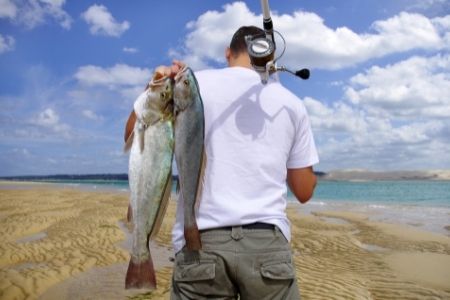
If you are currently looking for the best place to base your efforts on the water, the following list should be just what you have been looking for. Below are ten of the nation’s top saltwater fisheries.
- Panama City Beach, Florida
- San Diego, California
- Miami, Florida
- Venice, Louisiana
- Ocean City, Maryland
- Cape Cod, Massachusetts
- Key West, Florida
- Montauk, New York
- Seattle, Washington
- Galveston, Texas
The Benefits of Using a Boat to Saltwater Fish
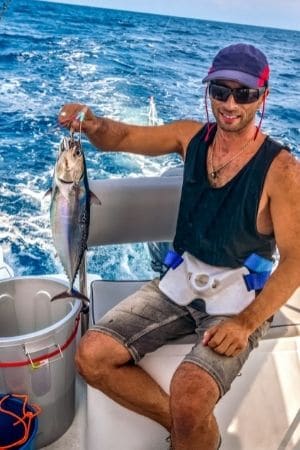
The ocean is a vast expanse, which offers a wealth of opportunities to anglers. However, this is only true if one can move about as needed to stay on the hot bite. While excellent fishing can be experienced when fishing from shore, the use of a boat allows an angler more freedom to work with the tides, currents, and baitfish movements, to position themselves as needed during any given day on the water.
Additionally, there are many saltwater fishing pursuits that one cannot participate in without using a boat. Deep-sea fishing is a sport built solely around the concept of reaching distant waters by vessel. Additionally, flat fishing is highly dependent upon rising and lowering tides. During low water periods, anglers fishing from the bank can be left with little to no recourse for access.
Luckily, you don’t have to be discouraged if you don’t own a boat. An angler can always charter a trip for almost any imaginable type of saltwater fishing excursion. While such trips do come with a fee, the excellent fishing that often comes as a result is well worth the initial expenditure.

